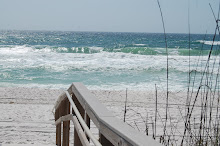"I always try to write on the principle of the iceberg. There is seven-eights of it under water for every part that shows. " - Ernest Hemingway.
"He looked across the sea and knew how alone he was now. But he could see the prisms in the deep dark water and the line stretching ahead and the strange undulation of the calm. The clouds were building up now for the trade wind and he looked ahead and saw a flight of wild ducks etching themselves against the sky over the water, then blurring, then etching again and he knew no man was ever alone on the sea. " - The Old Man and the Sea.
Side note- I find the above quote a good representation from The Old Man and the Sea, a story written much later than his ballyhooed "love and war" stories of the 30's. It contains longer sentences, flowing on in a way that tells me the reader Hemingway didn't want to skimp on his favorite topic- nature and specifically- the ocean.
My favorite Hemingway novel, "A Farewell to Arms" contains some particulary strong lines. If you have never read this book, I strongly suggest you sprint to a bookstore, library or Kindle (I don't care for e-bookreaders but whatever you need to do!) and read this story. It broke from the tradition of the "romantic" love story of the turn of the century era, and was written from a male perspective.
"Then we'd be both alike. Oh, darling I want you so much I want to be you too.
You are. We're the same one
I know it. At night we are.
The nights are grand.
I want us to be all mixed up. I don't want you to go away...why, darling I don't live at ll when I'm not with you."
To better understand this somewhat child like simple prose, remember the main character Frederick Henry and British nurse Catherine Barkley are in the midst of extreme stress, falling in love in war time Italy surrounded by dying soldiers, drunken officers and not knowing how the future will play out.
Henry reflects:
"If people bring so much courage to this world the world has to kill them to break them, so of course it kills them. The world breaks every one and afterward many are strong at the broken places. But those that will not break it kills. It kills the very good and the very gentle and the very brave impartially. If you are none of these you can be sure it will kill you too but there will be no special hurry."
Depressing- no, just a look into a soldier's musings while under duress and pondering his future. The novel is full of beautiful lines about the natural surroundings in Italy and later as they flee into Switzerland via a northern lake. There are short, humorous lines of dialogue between Henry, Catherine and fellow comrades "in arms", drinking, joking and eating each night as if it is their last. It may well be. I won't spoil the ending.
Subscribe to:
Post Comments (Atom)

No comments:
Post a Comment